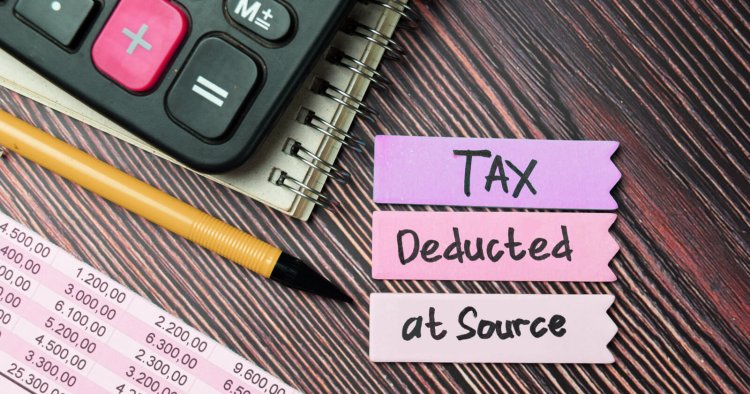Understanding Tax Deduction at Source (TDS)
Tax Deduction at Source (TDS) is a key part of India’s tax system, ensuring timely tax collection by deducting tax at the point of income payment. It applies to salaries, rent, interest, and professional fees. Understanding TDS is essential for accounting and finance careers, as it’s part of various accounting courses and certifications. TDS knowledge helps in roles like tax accountant, payroll officer, and finance executive. Courses like BAT, CPA, and online accounting certifications teach TDS concepts, making it a crucial, job-ready skill for professionals and students in taxation and finance.

Tax Deduction at Source (TDS) is a key feature of India’s tax system. It allows the government to collect a portion of taxes as soon as income is generated instead of waiting until the end of the financial year. Knowing how TDS works is crucial whether you're studying for a financial accounting certification, planning to become a certified corporate accountant, or pursuing a career in corporate finance.
What Does TDS Mean?
TDS is a method where a certain percentage of a payment is withheld by the person or entity making the payment (called the deductor) and is directly submitted to the Income Tax Department.
For example, if a business is paying ₹60,000 to a freelancer, it may have to deduct a part (say ₹6,000) as tax and pay the remaining ₹54,000 to the freelancer. The ₹6,000 is paid to the government as tax on behalf of the freelancer.
TDS applies to different income types, like:
-
Salaries
-
Interest
-
Rent
-
Professional fees
-
Commission
If you're enrolled in any accounting basics course, financial accounting diploma, or online accounting certification, you will learn how TDS is applied in different situations.
Why is TDS Necessary?
TDS ensures that the government collects tax revenue in a timely and consistent manner. This system helps prevent tax evasion and promotes accountability in financial transactions.
For learners enrolled in accounting diploma programs or job-ready accounting training, TDS is a practical concept that explains how taxes are managed at the organizational level.
Who is Required to Deduct TDS?
Any individual, company, or firm making specified types of payments, such as salaries, contractual fees, or interest income, may need to deduct TDS before making the payment. Professionals who have completed courses like corporate accounting, accounting and taxation training, or a diploma in finance are expected to be aware of such TDS procedures.
Major TDS Sections and Their Applicability
TDS rules are outlined under various sections of the Income Tax Act. Some commonly used sections are:
-
Section 192 – For salary income
-
Section 194A – For interest (excluding securities)
-
Section 194C – For contractor payments
-
Section 194J – For fees paid to professionals or technical experts
Understanding these is essential if you’re studying advanced accounting, income tax courses, or a complete taxation program.
How TDS Knowledge Helps in Your Career
Being familiar with TDS can boost your chances of getting hired for jobs in finance and accounting. Many employers look for TDS knowledge in roles such as:
-
Payroll Officer
-
Tax Analyst
-
Finance Executive
-
Compliance Assistant
-
Corporate Accountant
TDS Return Filing: Forms You Need to Know
TDS returns must be filed every quarter using specific forms. Common forms include:
-
Form 24Q – For salary-related deductions
-
Form 26Q – For non-salary payments to residents
-
Form 27Q – For payments made to non-residents
Mistakes while filing TDS can result in fines. That’s why many computer-based accounting courses, e-accounting modules, and online accounting classes with certificates include TDS return preparation as part of their curriculum.
Small Businesses and Freelancers: TDS Also Applies
Even independent professionals and small business owners are responsible for TDS when paying service providers.
For instance, a freelancer paying ₹40,000 to another consultant must check whether TDS is applicable under Section 194J and deduct accordingly.
Courses like:
-
Business Accounting and Taxation (BAT)
-
Short-Term Accounting Courses
-
Accounting Training Institutes
- SAP FICO (Finance & Controlling)
Conclusion
Understanding how TDS works is vital for anyone aiming to build a career in accounting, finance, or taxation. It’s one of the most commonly used tools in tax compliance. You’re pursuing a degree in finance, joining a 6-month accounting diploma, or enrolling in free certified accounting courses online, knowing that TDS will make your resume stronger and your work more accurate. If you're serious about building your career, enroll in the best accounting course in Kolkata. TDS is not just a tax rule—it’s a job-ready skill that adds real value to your profile.
What's Your Reaction?
















